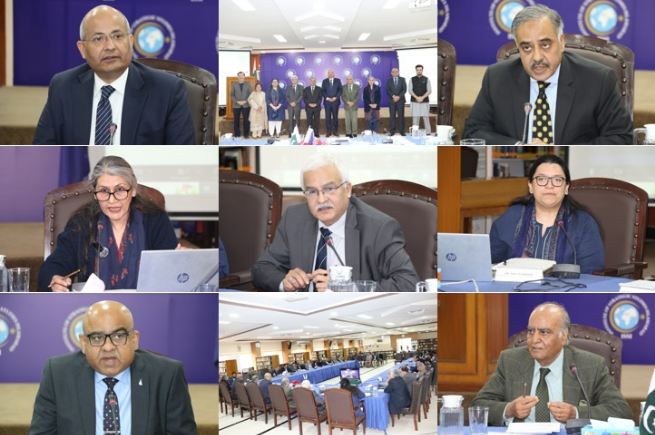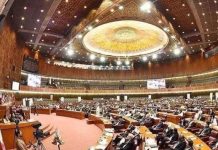ISLAMABAD, Feb 24 /DNA/ – The Arms Control and Disarmament Centre (ACDC) at the Institute of Strategic Studies Islamabad (ISSI), hosted a seminar on “Navigating the Cyber Frontier: Governance and Security in a Global Digital Commons” to underscore the commonalities and differences between cyberspace and other global commons by exploring potential threats to national and international security arising from or through cyberspace. Mr. Zarrar Hasham Khan, Secretary, IT & Telecommunication, Government of Pakistan, was the keynote speaker. Other distinguished speakers included: Air Marshal Zahid Mahmood (Retd.), Director, Centre for Aerospace & Security Studies; Dr. Mehreen Afzal, Director GRC, National Cyber Emergency Response Team (nCERT); Dr. Saadia Zahoor, Lawyer and Policy Expert; and Mr. Javaid Iqbal, Member of the Authority, Special Technology Zones Authority. The seminar was moderated by Malik Qasim Mustafa, Director, ACDC-ISSI.
Mr. Zarrar Hasham Khan, in his keynote address, underscored the transformative impact of industrial revolutions on global power dynamics, highlighting the emergence of data sovereignty as a critical aspect of national security. He emphasized the evolving nature of threats in an increasingly globalized world, necessitating robust digital governance frameworks. He further stressed the need for economic protection, advocating a shift from conventional strategic alliances to a comprehensive framework centered on data security. He highlighted that safeguarding national digital assets is imperative for long-term stability and resilience. While discussing critical infrastructure, he cautioned against the vulnerabilities posed by large-scale internet disruptions and emphasized the importance of proactive measures to enhance cybersecurity, ensuring national resilience in an era where digital connectivity is integral to governance, economic security, and strategic stability.
DG ISSI Ambassador Sohail Mahmood, in his welcome remarks, emphasized the strategic significance of cyberspace as a global common, akin to maritime and outer space, serving as the backbone of communication, trade, governance, and security. He underscored the growing cyber threats, including cyber warfare, espionage, and cybercrime, highlighting the urgent need for robust governance structures. Citing the Global Cybersecurity Outlook 2025, he noted that 72% of organizations reported increased cyber risks, with ransomware remaining a top concern and geopolitical tensions shaping cybersecurity strategies worldwide. He stressed that cyber governance is no longer a technical matter but a national security imperative, requiring comprehensive policies, legal frameworks, and international cooperation. He advocated for a holistic cybersecurity strategy crafted through multi-stakeholder consultations and envisaging collaborative action – aligned with Pakistan’s national security objectives. He also called for national capacity-building as well as multilateral engagement.
Earlier, in his introductory remarks, Malik Qasim Mustafa, Director ACDC, underscored the growing reliance on cyberspace and its profound impact on national security. However, this dependency has heightened vulnerabilities, exposing nations to cyber threats, cybercrimes, and cyber warfare, posing significant risks to critical infrastructure and strategic stability. He emphasized that Pakistan must strengthen its cybersecurity framework through robust governance, data protection, and resilience-building measures.
Air Marshal Zahid Mahmood elaborated on “Cybersecurity and National Security.” He outlined the shift from traditional to non-traditional security threats, emphasizing cybersecurity as a critical component of modern national security. He highlighted the role of cyber sovereignty, referencing China’s “Great Firewall” and Iran’s “Halal Internet” as examples of measures regarding digital infrastructure. He explained that cyber threats are driven by nation-states, cybercriminals, terrorist groups, and insider threats, each with distinct motivations, including financial gain, ideological warfare, and political dissatisfaction. He emphasized the need for robust cybersecurity policies, digital sovereignty, and enhanced cyber resilience to mitigate these evolving threats and safeguard national interests.
Dr. Mehreen Afzal shared her insights on “Cybersecurity as a Global Common” and underscored the escalating cyber challenges confronting the nation. She highlighted the surge in cyberattacks, including hacking, identity theft, and financial fraud, which pose significant threats to national security and economic stability. She emphasized the necessity for robust cybersecurity policies and regulations, comprehensive awareness programs, and the adoption of advanced technologies to fortify Pakistan’s digital infrastructure. She concluded by asserting that securing cyberspace is a collective responsibility, requiring coordinated efforts from all stakeholders to ensure a safe and resilient digital environment.
Dr. Saadia Zahoor exploring “Cyber Governance and International Law” emphasized that cyberspace, as a global domain, challenges traditional notions of state sovereignty, with cyber threats transcending borders and impacting national security, critical infrastructure, and economic stability. This borderless nature renders conventional security paradigms less effective, as cyber threats can originate from diverse actors including nation-states, cybercriminals, and terrorist groups with motivations ranging from financial gain to ideological agendas. She underscored the urgent need for robust cybersecurity policies, stronger international cooperation, and the development of binding legal norms to regulate cyber activities.
Mr. Javaid Iqbal while discussing “Cyber Threat Landscape & Readiness Imperatives for Pakistan” emphasized that AI has become a double-edged sword, amplifying cyber threats through sophisticated phishing attacks, AI-driven disinformation campaigns, and advanced hacking techniques. He highlighted major cyber incidents, such as attacks on the National Bank of Pakistan, FBR, and NADRA. He stressed the need for a National Cyber Security Strategy, AI capacity-building, and enhanced early warning systems to safeguard critical infrastructure, including telecommunications and nuclear facilities. He underscored that cybersecurity must be treated as a national emergency, requiring proactive measures to combat cyber threats and disinformation both domestically and internationally, ensuring the security and resilience of Pakistan’s digital infrastructure.
Chairman BOG Ambassador Khalid Mahmood, in his vote of thanks, highlighted the unprecedented pace of technological advancements. He stressed the need for proactive actions at the policy, legal, and technical levels, along with capacity building. While appreciating the government’s efforts despite limited resources, he underscored that collaboration with the private sector, regional states, and international organizations is essential.

















